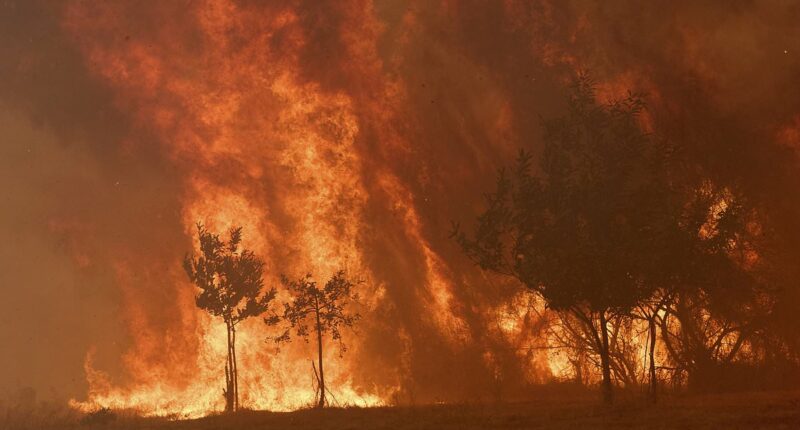Share this @internewscast.com
Deadly fires are raging through Spain and Portugal as the worst wildfire season on record continues across the continent.
Villages have been evacuated, farmers enlisted to tackle the flames, and extensive areas of land have been devastated, quadrupling the average for this period, according to official figures.
Over 1 million hectares have burned so far, surpassing the previous record of 988,544 hectares set in 2017, with more hazardous fire weather anticipated.
Homes have been reduced to ashes, forests turned black, and thick smoke has blanketed cities for miles.
The fires have emitted approximately 37 million tonnes of carbon dioxide—the equivalent of the annual emissions of Portugal or Sweden—while PM2.5 particles, which can penetrate deep into the lungs, have reached record levels.
Experts say climate change and human land use are driving conditions for ever-larger, more intense wildfires, the Guardian reports.
Cristina Santín Nuño, a fire researcher at Spain’s National Research Council, stated that while the magnitude of this year’s fires is alarming, it is not unexpected.
‘It is sad and scary – my home region is burning right now – but not surprising, really,’ she said.

Villages have been evacuated, farmers drafted in to fight the flames, and huge areas of land have been destroyed

Spain is enduring its most devastating wildfire season since records began, with blazes consuming more than 382,000 hectares of land

This marks Spain’s worst-ever fire season since records began in 2006. It has eclipsed 2022’s case, when 306,000 hectares were burned
A prolonged heatwave across the Mediterranean and Balkans has pushed temperatures above 40C.
The searing heat has dried vegetation, creating tinderbox conditions that allow fires to spread faster and burn hotter.
Victor Resco de Dios, a forestry engineer at the University of Lleida, explained that heatwaves have made grasses and herbs more flammable, while unstable atmospheric conditions have ignited fire storms.
More than a dozen fatalities have been confirmed, though experts caution that the actual toll is likely higher, with toxic smoke damaging lungs and entering the bloodstream.
A 2019 study estimated wildfire smoke contributes to 111,000 deaths a year across Europe, including Russia.
The EU’s monitoring service said Spain’s wildfire emissions this year reached the highest levels in 23 years, worsened by smoke drifting from Canada’s own massive fires.
Santín Nuño warned that while catastrophic wildfire seasons may not occur annually, the likelihood of record-breaking events is rising.
She said: ‘This is a new reality. And the sooner we realise it, and take action to be more resilient to these types of wildfires, the better.’

Portugal has been battling blazes since late July, with the north and centre hardest hit

A resident walks among the rubble of houses destroyed by a wildfire in the Spanish northwestern village of San Vicente de Leira, in Ourense province, on August 19, 2025

Firefighters fight with the forest fire at Malhada do Rei, Pampilhosa da Serra, Portugal

SpanishPrime Minister Pedro Sánchez warned on August 19 that ‘difficult hours remain’ as exhausted emergency crews continue battling infernos that have destroyed villages
In Portugal, a 65-year-old man was killed when his bulldozer ran over him as he tried to escape fast-moving flames in Mirandela.
The country has been battling blazes since late July, with the north and centre hardest hit.
More than 216,000 hectares have burned this summer, around 2.3% of Portugal’s land, with two firefighters dead and more than 130 people injured, many of them emergency workers.
One deadly fire tornado in the north claimed the life of a former mayor as he tried to defend his town.
Last week, the mayor of Vila Real said: ‘We are under enormous attack, with absolutely incalculable losses, the resources are clearly insufficient given the scale of what we are experiencing.’
In Spain, at least four people have died as wildfires continue to scorch the land. In Librilla, Murcia, a tornado swept away café terraces and threw debris into the streets, reducing visibility to near zero.
Locals screamed as wheelie bins and outdoor furniture were hurled into the road.

Local police said the high winds were carrying away embers that could cause wildfires

The freak weather forced the town hall to cancel a BBQ event organised as part of its annual summer festival because of the fire risk if it went ahead.
The Costa Tropical south of Granada also faced extreme conditions when the so-called ‘Satan’s Storm’ struck, forcing beach evacuations in resorts like Motril and prompting seven emergency rescues.
Two tornadoes and waterspouts formed as temperatures surged past 37.8C (100°F) and winds reached 53mph.
The freak weather forced the town hall to cancel a planned summer BBQ due to fire risk.
Police warned that high winds were carrying embers capable of igniting further fires.
In one dramatic moment, a woman holding a large parasol was blown over by a gust, as tables and chairs smashed around her.
The area where the BBQ had been organised was turned into a dustbowl.
An electricity pylon was also snapped in half and brought down by the force of the wind.
Local police said in a statement: ‘A tornado has carried away sunshades, chairs and tables at bars as it swept through Librilla.
‘The town hall has had to cancel its ‘Night of Migas’ BBQ event because of the fire risk as the tornado carried away tables and chairs people had put out and even embers.
‘Our officers and Civil Protection workers are still dealing with incidents involving fallen trees and lampposts.’
















